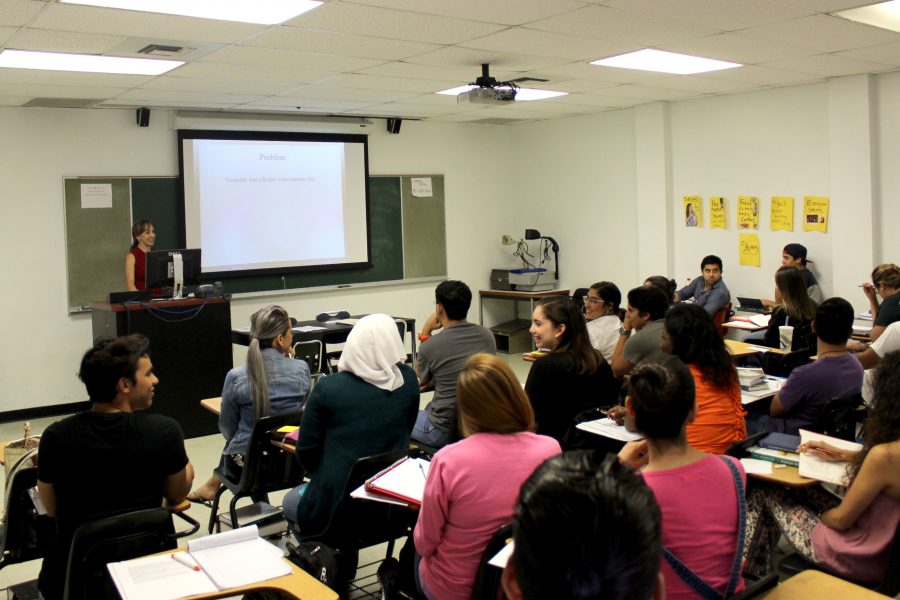Coffee and all-nighters are a huge part of the lifestyle of some of the students who are enrolled in the summer Law School Preparation Institute at UTEP.
LSPI is offered to students seeking a law education during the summer. The program was initiated in 1998 to serve the goals of students in the border community who wanted to seek further education to have a law career.
It spans approximately four weeks and is known for its intensity and rigorous workload. Paulina Escobar, a UTEP graduate who attended LSPI, said her experience at the program was helpful, but difficult at the same time.
“I was happily dying. In the sense that it is very intense and interesting. That first week of LSPI I did not sleep,” said Escobar, a UTEP graduate who will be attending law school at the University of Iowa. “I wasn’t too sure if I wanted to go into law school, but once I got into this I enjoyed it and it has been very rewarding.”
The program is only offered during the summer semesters as a way of preparing students for the LSAT exam offered during the fall. LSPI assistant director Brent McCune, said this is a way in which his students will only focus their study time on what the exam will require.
“Our goal is to position students in the best way to achieve success in law school,” McCune said.
The program is not all about studying and books. Students get hands-on experience by working with different groups that handle certain types of cases.
LSPI and the Court Appointed Special Advocates for children (CASA of El Paso) allow LSPI students at UTEP to participate in a service-learning course where the students serve vulnerable children in need.
The students look at whole cases and make recommendations to the court in the best interests of the children involved in each case.
“We advocate in court for the best interest of children who have been removed from home due to abuse or neglect,”said Lisa Soto, associate clinical professor. “The students and I work on teams on all of the cases that we are assigned, and really the students do the work on the cases too. They are in court, they sit at the attorney table, they are the only non-attorneys who sit and present with attorneys.”
Encouraging More Positive Opportunities with Empathy and Respect, known as EMPOWER, is a deferred prosecution program for first-time offenders with serious mental illness issues. Escobar says that the goal of the program is to take youth out of the juvenile system to connect them with services that will rehabilitate them.
Escobar said LSPI students learn a lot while playing an important role in this program. Students serve as moderators who preside over formal courtroom status reviews and compliance monitors to help families to achieve their treatment plan requirements.
“I studied psychology, but it’s one thing to read about it and another to work with someone who actually has mental illness issues like ADHD,” Escobar said. “You can see that they just need a little of guidance. A lot of these families were not aware of what it meant to have a child with mental health issues so they didn’t know how to handle them, but we were able to help them.”
The LSPI program has received awards from the El Paso Juvenile Justice Center and from the Paso del Norte Civil Rights Project, as well as earned respect from bigger legal markets.
William Weaver, director of the program, and seven students are presently in Dallas. McCune said the Dallas legal community is interested in UTEP’s program and decided to take students from UTEP to Dallas as a way of giving the students a real-life experience.
“They are getting a taste of what the Dallas legal market is like,” McCune said. “They are having visits at law firms, taking legal talks and seminars, to seating on courts, to having meet and greets, and dinner and lunches with members of the Dallas legal community.”
McCune said his students will be acquiring knowledge that will allow them to serve under-represented communities. He hopes UTEP students can serve the needs of these people.
“Whether we like them or not, we need attorneys. And it’s nice when the attorneys can relate to their clients,” McCune said. “You can go to law school; you can really do this. And then you can give back to your community.”
In the end, students taking the LSPI program said this program does more than teach about being a lawyer.
“The professors choose the students to enhance the program and they see something in you that perhaps you never saw in yourself,” said Hala Abdeljaber, political science major, said. “This program will make you better person.”
Rene Delgadillo may be reached at [email protected].










